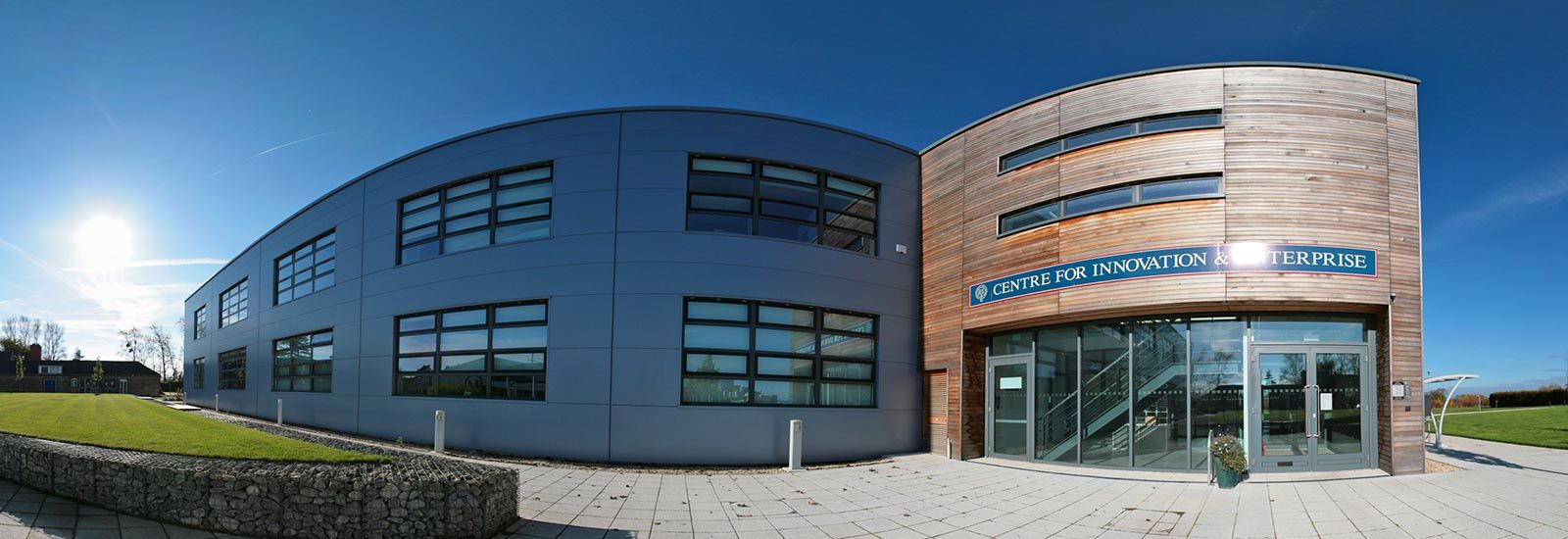
The economy
The University of Oxford, including the colleges and Oxford University Press, is the county’s largest employer. It is responsible for 17,000 jobs and injects £750 million annually into the local economy.
In December 2014 the UK government confirmed that the University was responsible for the largest volume of world-leading research and impact in the UK. In October 2015 The Times Higher Education university rankings rated Oxford second overall only to Harvard, and first for the importance of its research. Much of this research is built on locally in business spin-outs.
The University of Oxford was one of the pioneers of university spin-outs. Its very first, Oxford Instruments, was established in 1959 and is now a global leader, employing 1,900 people in 13 different countries.
In May 2015 the University launched a partnership with the newly-created Oxford Sciences Innovation plc. With £320 million in funding provided by six investors including the Wellcome Trust and Landsdowne Partners, the aim is to turn cutting-edge research from the Medical Sciences and Mathematical, Physical and Life Sciences Divisions into successful applications.
Commercialisation activities by Oxford University Innovation Ltd. (the University’s wholly owned research and technology commercialisation organisation) support 1,600 jobs in Oxfordshire. In 2014 OUI filed 23 patents based on research undertaken within the Department of Engineering Science alone. OUI manages a total of 2,490 patents in all and generated £24.6 million revenue in 2015 (£14.5 million in 2014).
Through the City Deal (which provides £750,000 for University start-ups and spin-outs) the University has leveraged a further £10 million of private sector investment, to generate 90 jobs by March 2017.
The University is an active member of the Oxford Local Economic Partnership (OxLep) and works with it to ensure the maximum of investment in the region, along with appropriate planning for infrastructure development and growth.
The colleges, parks, museums, halls and libraries of the University are part of the unique draw of the city which brings 6.6 million tourists to the area, spending £574 million and supporting 12,000 jobs in the region.
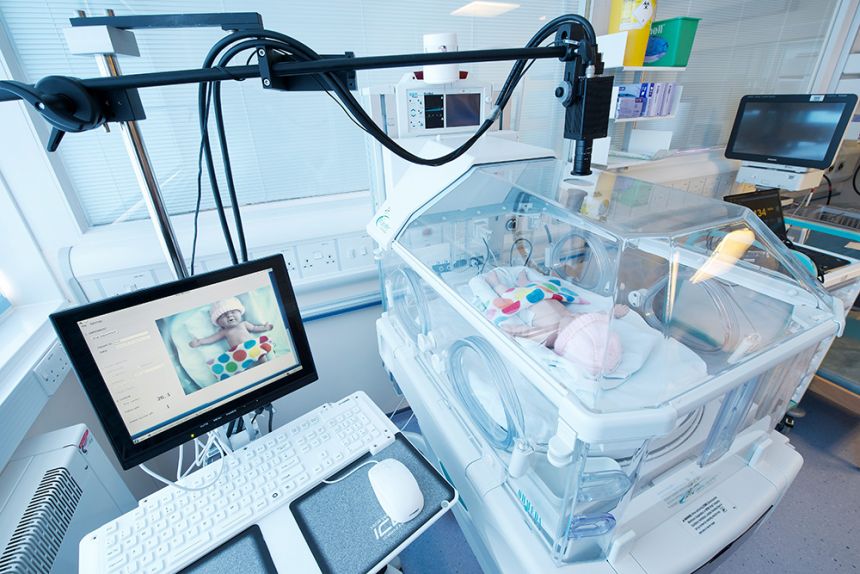 Oxehealth’s Oxecam video baby monitors are able to measure the heart and respiratory rate of a baby remotely
Oxehealth’s Oxecam video baby monitors are able to measure the heart and respiratory rate of a baby remotelyBegbroke Science Park
Opened in 2000 by Lord Sainsbury, then Minister for Science and Innovation, Begbroke Science Park is owned and managed by Oxford University. It is home to numerous research groups as well as many successful science-based businesses like Oxford Photovoltaics and Oxford Gene Technology, and new spin-outs like Bodle Technologies, Oxford Genetics and Animal Dynamics. Begbroke currently employs over 500 people although this is set to grow as the Begbroke Innovation Accelerator, a project announced by the Chancellor of the Exchequer, George Osborne, opens in summer 2016 adding 5400m2 of new flexible laboratory and office space.
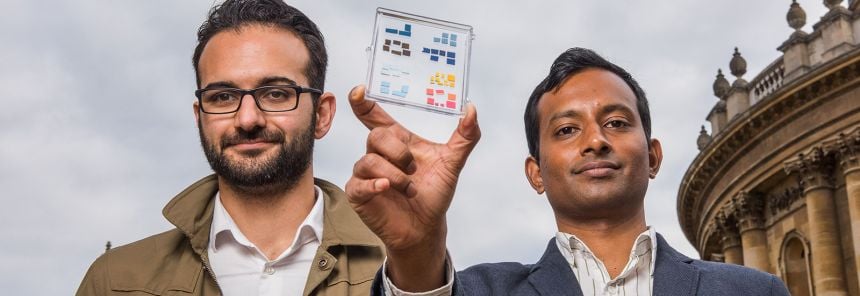 Professor Harish Bhaskaran (right) and Dr Peiman Hosseini of Bodle Technologies
Professor Harish Bhaskaran (right) and Dr Peiman Hosseini of Bodle TechnologiesCredit: John Cairns
Begbroke Science Park works closely with the local community providing a programme of school events, functioning as a conference venue and supporting numerous local activities.
Oxford Science Park
Covering 50,000m2 of office and laboratory space, the Oxford Science Park is wholly owned by Magdalen College. It employs more than 2,000 people and has been operating since 1990. Over 40% of the business is in the pharmaceutical and biomedical sphere, and includes successful spin-outs such as OrganOx and Oxford Nanopore.
Saïd Business School is the University of Oxford’s department for studies in business, management and finance.
It aims to translate high-level academic research into global change, creating a network between the University’s academics and dynamic, experienced businesspeople. Every year, groups of MBA students from Oxford undertake projects in which they offer free consultancy services to businesses.
In 2015 a team worked with local company Adlens. First established in 2005 with the aim of providing much-needed corrective vision solutions to the developing world, Adlens is now a global enterprise leading the development and sale of variable-focus glasses. Oxford's MBA students helped the company to analyse the market and the effectiveness of its business model.
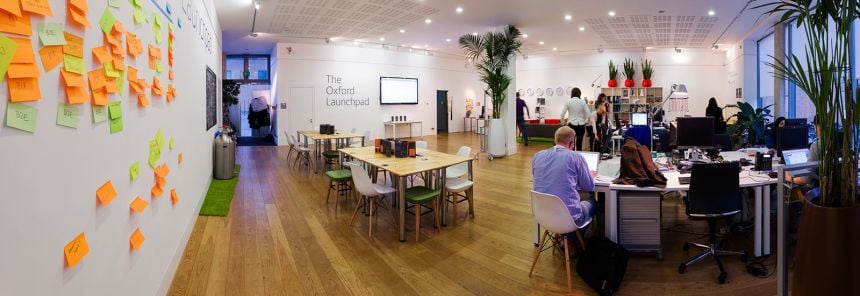 The Oxford Launchpad provides a bespoke workspace for entrepreneurial thinking
The Oxford Launchpad provides a bespoke workspace for entrepreneurial thinkingCredit: Alan Staley
Using entrepreneurship to create social benefits
The Skoll Centre for Social Entrepreneurship is part of the Saïd Business School. It supports entrepreneurial activity that aims to tackle social inequalities and environmental challenges across the world by transforming unjust or unsatisfactory systems and practices.
It does this by training talented individuals, producing research and linking up a global community of social entrepreneurs, influential thinkers and key players in business, government and philanthropy. Leading for Impact is a programme offered in partnership by the Skoll Centre and the Berlin-based DO School, for Oxford University students who want to pursue social benefit through their careers.
Adlens also participated in this programme; the students were challenged to create a business model for bringing adjustable glasses to a section of the Indian market. They learned how adjustable-focus eyewear can be combined with smartphone diagnosis methods to provide low-cost, effective eye care to 90% of all people with sight problems.
The Skoll Centre also offers a scholarship programme for Oxford MBA students. Skoll Scholars are proven entrepreneurial leaders who have worked to tackle global issues such as water, health and improving access to energy and financial services.
They are an ever-growing group of talented people who, in the words of one of their number, ‘are working super-hard to change the world’.
Oxford University Press (OUP) is one of the biggest employers in Oxford, with around 1,800 people working in its city offices every day.
The press also contributes funds and books to local charities that share the University’s mission in the area of education.
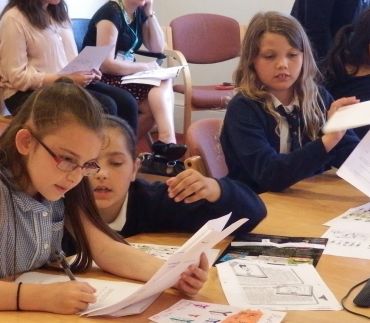 Young students visit OUP as part of the ARCh assisted reading scheme
Young students visit OUP as part of the ARCh assisted reading scheme
Since 2012 44 OUP employees have volunteered with the ARCh programme and helped 44 children to develop their reading ability. OUP also supports the programme financially, to train its volunteers, as well as through book donations.
Crisis is the national charity for homeless people. It offers education, employment and housing and wellbeing services to transform lives and end homelessness.
The Oxford Skylight opened in 2011 and is located in central Oxford. In 2011 OUP committed to supporting Crisis Skylight Oxford’s work with homeless and vulnerably housed people in the city. OUP’s support helps Crisis Skylight offer courses in literacy, mathematics, IT, carpentry and gardening, to enable people to return to work.
OUP also donates books to Crisis Skylight centres throughout the UK. These enable Crisis tutors to run courses and give users access to valuable reading material.
First Story empowers secondary school students by working with them to nurture creativity and communication skills through creative writing. First Story pays for professional writers to go into schools and provide workshops, culminating in an anthology of the students’ work.
Six schools participate in the programme in Oxford. OUP helps the students design the covers for these anthologies and provides advice about the production process. Some of the students have also had access to work experience at OUP.